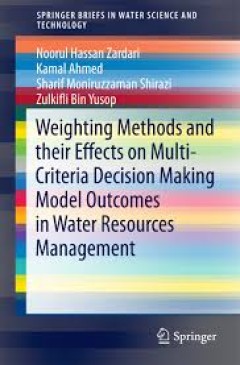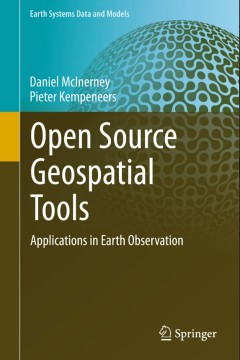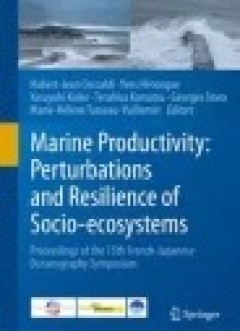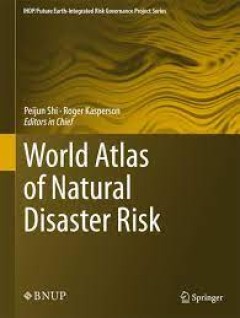Filter by

Assessment of Climate Change over the Indian Region
This open access book discusses the impact of human-induced global climate change on the regional climate and monsoons of the Indian subcontinent, adjoining Indian Ocean and the Himalayas. It documents the regional climate change projections based on the climate models used in the IPCC Fifth Assessment Report (AR5) and climate change modeling studies using the IITM Earth System Model (ESM) and …
- Edition
- 1
- ISBN/ISSN
- 9789811543272
- Collation
- XXI, 226 hlm; ill., lamp.,
- Series Title
- -
- Call Number
- -

Forest and Rangeland Soils of the United States Under Changing = A Comprehen…
This open access book synthesizes leading-edge science and management information about forest and rangeland soils of the United States. It offers ways to better understand changing conditions and their impacts on soils, and explores directions that positively affect the future of forest and rangeland soil health. This book outlines soil processes and identifies the research needed to manage fo…
- Edition
- 1
- ISBN/ISSN
- 9783030452162
- Collation
- XXVI, 289 hlm; ill., lamp.,
- Series Title
- -
- Call Number
- -

Manual of Digital Earth
This open access book offers a summary of the development of Digital Earth over the past twenty years. By reviewing the initial vision of Digital Earth, the evolution of that vision, the relevant key technologies, and the role of Digital Earth in helping people respond to global challenges, this publication reveals how and why Digital Earth is becoming vital for acquiring, processing, analysing…
- Edition
- 1
- ISBN/ISSN
- 9789813299153
- Collation
- XIX, 852 hlm; ill., lamp.,
- Series Title
- -
- Call Number
- -

Ocean-Atmosphere Interactions of Gases and Particles
The oceans and atmosphere interact through various processes, including the transfer of momentum, heat, gases and particles. In this book leading international experts come together to provide a state-of-the-art account of these exchanges and their role in the Earth-system, with particular focus on gases and particles. Chapters in the book cover: i) the ocean-atmosphere exchange of short-lived…
- Edition
- -
- ISBN/ISSN
- 978-3-642-25643-1
- Collation
- LI, 315
- Series Title
- Springer Earth System Sciences (SPRINGEREARTH)
- Call Number
- -

Land Use Cover Datasets and Validation Tools
This open access book represents a comprehensive review of available land-use cover data and techniques to validate and analyze this type of spatial information. The book provides the basic theory needed to understand the progress of LUCC mapping/modeling validation practice. It makes accessible to any interested user most of the research community's methods and techniques to validate LUC maps …
- Edition
- 1
- ISBN/ISSN
- 978-3-030-90998-7
- Collation
- -
- Series Title
- -
- Call Number
- XIV, 462

Weighting Methods and their Effects on Multi-Criteria Decision Making Model O…
This book provides a systematic way of how to make better decisions in water resources management. The applications of three weighting methods namely rating, ranking, and ratio are discussed in this book. Additionally, data mining on keywords is presented using three popular scholarly databases: Science Direct, Scopus, and SciVerse. Four abbreviated keywords (MCDM, MCDA, MCA, MADM) representing…
- Edition
- -
- ISBN/ISSN
- 978-3-319-12586-2
- Collation
- -
- Series Title
- -
- Call Number
- -

Towards an Interdisciplinary Approach in Earth System Science Advances of a …
This book describes the latest advances at the Helmholtz “Earth System Science Research School” where scientists from the Alfred Wegener Institute in Bremerhaven, the University of Bremen, and the Jacobs University are involved in research. One of the greatest challenges is understanding ongoing environmental changes. The longer the time scale the more components of the Earth system are in…
- Edition
- -
- ISBN/ISSN
- 978-3-319-13865-7
- Collation
- -
- Series Title
- -
- Call Number
- -

Open Source Geospatial Tools:Applications in Earth Observation
This book focuses on the use of open source software for geospatial analysis. It demonstrates the effectiveness of the command line interface for handling both vector, raster and 3D geospatial data. Appropriate open-source tools for data processing are clearly explained and discusses how they can be used to solve everyday tasks.A series of fully worked case studies are presented including vecto…
- Edition
- 1
- ISBN/ISSN
- 978-3-319-01823-2
- Collation
- XXVII, 358
- Series Title
- Earth Systems Data and Models
- Call Number
- -

Marine Productivity: Perturbations and Resilience of Socio-ecosystems: Procee…
The 15th Franco-Japanese Symposium of Oceanography “Marine Productivity, Perturbations and Resilience of Socio-Ecosystems,” organized by the long-standing partners Société franco-japonaise d'Océanographie de France and Société franco-japonaise d'Océanographie du Japon, reviewed the impacts of natural (storms, typhoons, earthquakes, tsunamis, etc.) and man-made (pollution, buildings in…
- Edition
- -
- ISBN/ISSN
- 978-3-319-13878-7
- Collation
- -
- Series Title
- -
- Call Number
- -

World Atlas of Natural Disaster Risk
This is the first English-language atlas to systematically introduce the environment, hazard, vulnerability and risk mapping for 11 natural disasters, i.e. earthquake, volcano, landslide, flood, storm surge, sand-dust storm, tropical cyclone, heat wave, cold wave, drought and wildfire, and risk mapping for multi-hazard disaster in the world. The above 11 hazards are assessed and mapped at grid …
- Edition
- -
- ISBN/ISSN
- 978-3-662-45430-5
- Collation
- -
- Series Title
- -
- Call Number
- -
 Computer Science, Information & General Works
Computer Science, Information & General Works  Philosophy & Psychology
Philosophy & Psychology  Religion
Religion  Social Sciences
Social Sciences  Language
Language  Pure Science
Pure Science  Applied Sciences
Applied Sciences  Art & Recreation
Art & Recreation  Literature
Literature  History & Geography
History & Geography